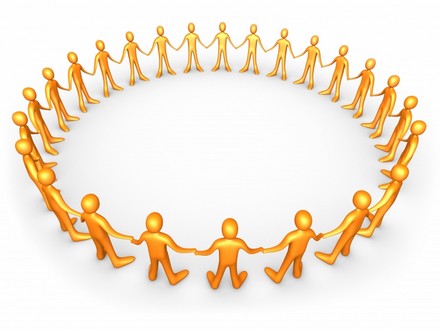April 29, 2024 | Spiritual Preparedness | No Comments

It’s our life’s pursuit: Happiness.
In fact, if you were to search books related to happiness on Amazon, you would find over 75,000 results. Author and psychologist, Dr. Martin Seligman has explained that the number one contributor to happiness is the quality of a person’s social circle.
That deserves a repeat:
The number one thing that contributes to someone’s happiness
is the quality of their social circle.
[ Just food for thought when it comes to being prepared for a disaster.
How is the quality of your social circle that you can turn to and rely upon when there is an emergency? ]

Dr. Seligman indicates that the main reason women live longer than men is due to the fact that their social circles are larger. Many people think that when a man loses his wife, he will succumb sooner to death as well because he has no one to care for him except himself. However, that is not true. A man will pass away sooner because he does not have a social circle that he can rely on.
Hank Smith, author and public speaker, states that brain scans over the last decade have become absolutely wonderful. He says that our frontal lobe is where happiness is stationed. When a person feels very sad, the right side of the frontal lobe lights up. Then when a person feels joy, the left part of the frontal lobe lights up. Joy and sorrow happen in different places in our brain.

If we want to help the left frontal lobe of our brain come alive, we should try meditation. Hank Smith states that meditation can fire up that area and flood your brain with dopamine. The brain has over 100 billion neurons that all talk to each other, and in doing so, they need chemicals or neurotransmitters. The three chemicals that make a person feel happy are dopamine, serotonin, and norepinephrine. When the levels of these chemicals get low, it may make a person feel unhappy. Some people are able to finally feel happy by taking medications that help these chemicals return to normal levels.
Happiness researcher, Kate Bratskeir, compiled a list from forty years worth of studies. She called this list “The Habits of Supremely Happy People”. Some of these you may already know, but it’s still helpful to learn it ag’ain.
10 things that supremely happy people do:
1. They keep themselves surrounded by other happy folks.
Joy is contagious. You are 4x more apt to be happy in the future if you have happy people around you. Happy people like to keep uplifting people around them and tend to gravitate away from those who constantly bring them down.
2. They try to be happy.
When they aren’t feeling so joyful, they work to cultivate a happy thought and smile about it. Researchers say that resilience is the opposite of depression. Happy people cultivate resilience and practice bouncing back from failure.
3. They spend money more often for others than they do for themselves.
Givers experience what’s called the “helper’s high.” Money doesn’t buy happiness yet spending money on other people has more direct impact on a person’s happiness than simply spending on oneself.
4. They have deep in-person conversations.
Happy people sit down, face to face, to talk about what makes a person tick. Studies have shown that people who participate in more substantial conversations and less trivial chatting have more feelings of satisfaction.
5. They use laughter as a medicine.
A good old-fashioned chuckle releases those happy chemicals in the brain. One study showed that kids generally laugh 300x in a day where adults typically laugh 15x a day. Also, our body’s response to laughter is like the effect of exercise. Not only do happy people laugh often, they can laugh at themselves too.
6. They use the power of music.
The power of music compares to the stress-reducing effects that massage therapy has. Happy people know that the music they choose affects their mood, so they choose uplifting and positive music to power up their day.
7. They exercise regularly and eat a healthy diet.
Having a diet of unhealthy foods may contribute to depression. Exercise gives you endorphins which make you happy. It can also improve how you feel about your body even if you don’t lose weight or meet your noted improvements. Happy individuals keep themselves more active and healthy.
8. They make the time to unplug and go outside.
Continual time spent staring at a screen can bring on anxiety and depression. Happy people take time to meditate and disconnect from electronics for a time. Although technology won’t be going away anytime soon, engaging in a form of digital detox occasionally can give your brain the ability to recover and recharge which also increases your resilience. Next time you want to feel alive, try going outside for a dose of fresh air for 20 minutes. Connecting with nature is a sure way to feel energized.
9. They get enough sleep.
Lack of sleep leaves a person susceptible to bad moods, poor judgment and lack of clarity. Happy people make sure they get enough sleep (8 or more hours a night) to stay more emotionally stable and be less apt to cave in to stress.
10. They are spiritual.
Happy people express more gratitude, show more compassion, and feel that their life has a purpose. These are attributes promoted in most spiritual and religious practices. Being spiritual is allowing yourself to have a sacred time to truly unplug from the world and reflect on a greater purpose. It is having faith in something greater than oneself.
So how does all this relate to being prepared? Practicing happiness now can help us have the spiritual strength and faith to get through tragic and emergency times in the future. It can help us be able to comfort others, to not fall into despair, and to find joy in times of extreme hardship. Practicing these habits of happy people may even more essential in our emergency preparation than anything else.
Read more about the surprising science behind supremely happy people here.
10 things happy people do, faith, how to be happy, social circle, Tips to be happy

